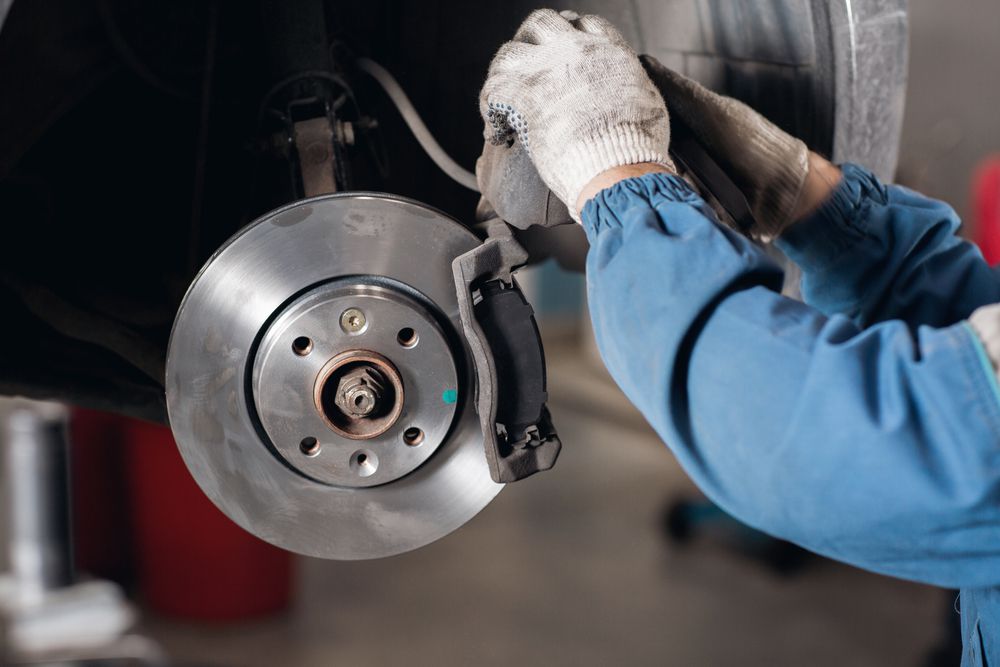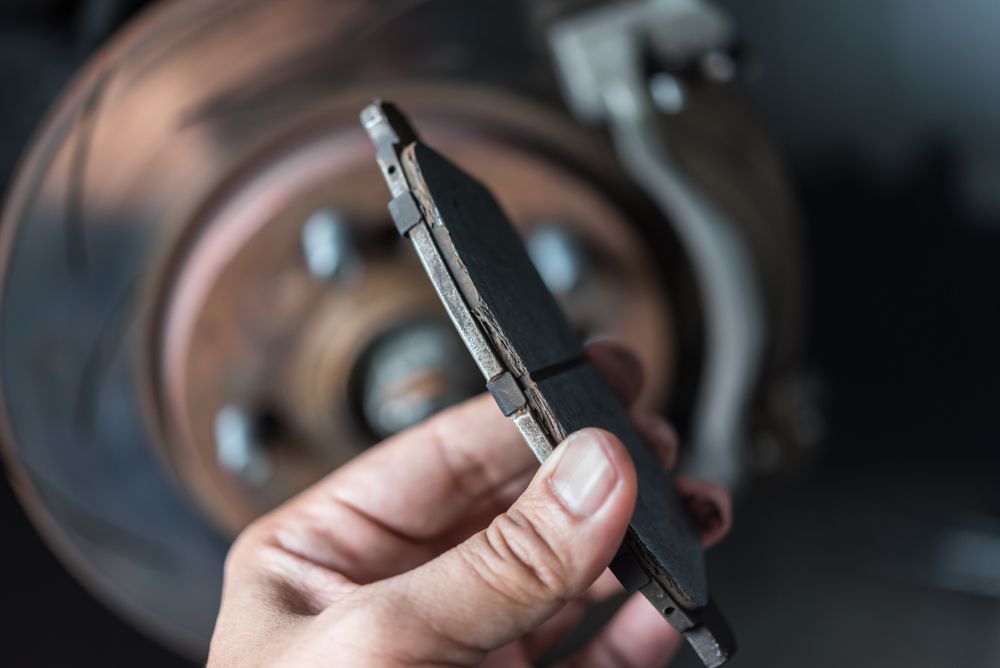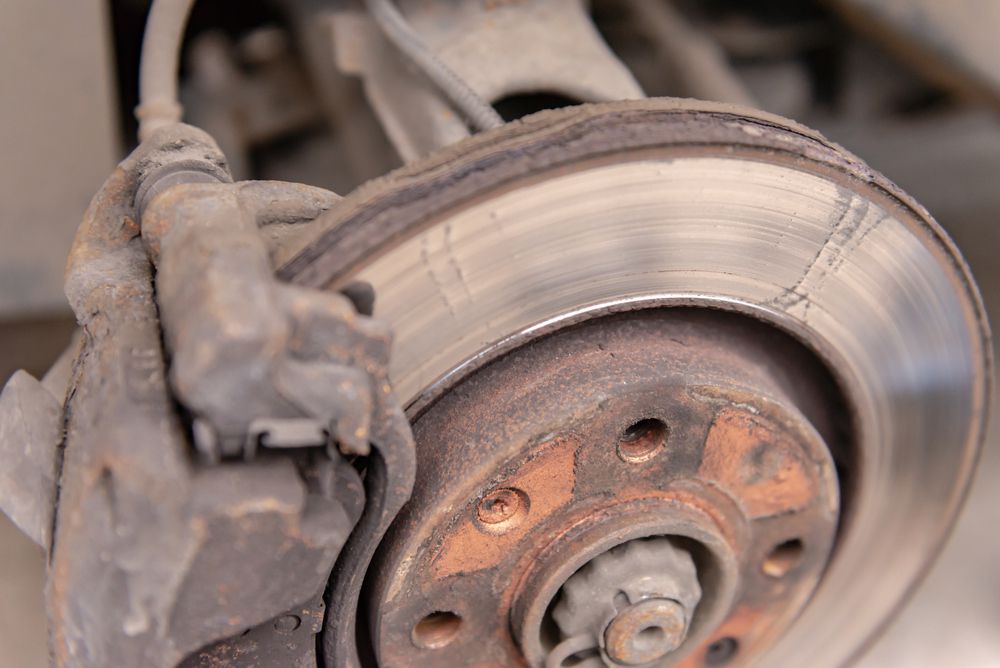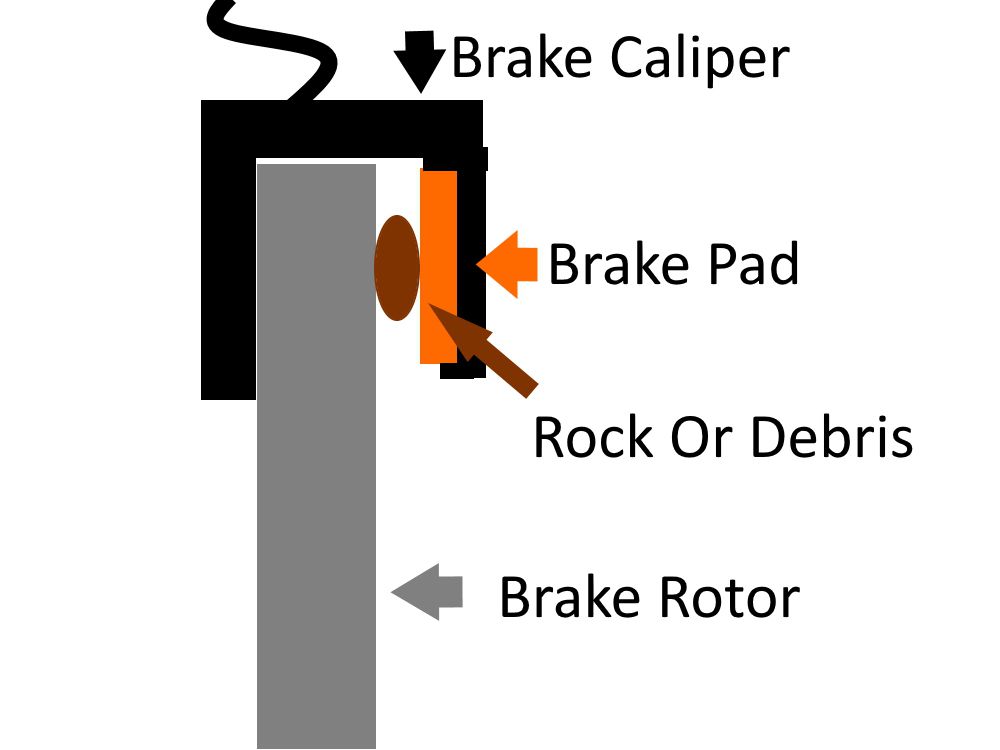Brakes are a “wear” item on your car or, put another way, brakes wear out over time and need to be serviced and replaced regularly.
Is it bad to drive on grinding brakes? How long can you drive on grinding brake pads?
Brakes can make a grinding noise if the pads or rotor are worn out, if debris, such as a rock, gets stuck between the rotor and caliper, if you have a faulty wheel bearing, or if the car is sitting idle for too long. If your brakes are grinding, you should stop driving your vehicle ASAP until you troubleshoot the problem and determine it is safe to drive.
 Mechanic working on brake assembly
Mechanic working on brake assembly
How Long Can You Drive with Grinding Brakes?
How long you drive with grinding brakes depends on what is causing the noise in the first place. If your brakes are grinding, you should find out what the noise is as soon as possible.
Depending on what is causing the brakes to grind, you can quickly cause damage to your vehicle's rotors, causing a much more expensive fix.
Is It Safe to Drive with Grinding Brakes?
You might be wondering: can I drive if my brakes are grinding? Or, if my brakes are grinding, do I need new rotors?
Grinding brakes are a warning sign that something is amiss with the braking system that needs to be corrected.
The first thing to do is determine what is causing your brakes to grind.
The only time it's safe to drive on grinding brakes is if you've just had new brakes installed.
What Causes Grinding Brakes?
Several things can cause brakes to grind. These include:
 Mechanic showing worn brake pad
Mechanic showing worn brake pad
New Brakes Grinding
New brakes must be worn in by use and may make a grinding or squealing noise right after installation.
However, you should notice that the grinding sound disappears within a few weeks as the brakes are worn in.
If the grinding persists after about 50 miles, consider taking your car back to the shop to get checked.
Old Brake Pads Grinding
Brake pads have a wear indicator built into them. When the brake pad wears down to the indicator, it will squeal or grind, letting the driver know it's time to take the vehicle to the shop to install new pads.
A Rock Or Piece Of Debris
A rock or piece of debris stuck between the brake pad and rotor will cause the brakes to squeal or grind. This may even happen when driving without the brakes being applied.
Worn Out Brake Shims
Brake pad shims fit between the brake pads and the brake calipers, to reduce the vibration of the brake pads. When they wear out, the brake pads will vibrate and make contact with the rotor, causing a squealing or grinding noise.
Worn Brake Rotors
Worn brake rotors can cause brakes to make noises. Often, when a rotor is worn, it will cause the vehicle to vibrate whenever the brakes are applied.
 Worn brake rotor
Worn brake rotor
Bad Wheel Bearings
Although not part of the braking system, bad wheel bearings can also create grinding noises if they contact the rotor while the car is in motion.
Driving with a bad wheel bearing can be extremely dangerous, so you'll want to get them checked as soon as possible.
What to Do If Your Brakes Start Making Grinding Sounds?
If your brakes start making grinding noises, you can investigate the issue yourself if you have experience working with cars.
Identify the likely cause based on the sound and where it's coming from, and remove the tire to inspect the braking system.
How to Troubleshoot Grinding Brakes?
To troubleshoot grinding brakes, you'll want to identify where the noise comes from.
The most likely cause of grinding brakes is a rock or pebble stuck between the brake pad and the rotor. Luckily this is usually simple to remedy.
The first thing to try if your brakes start grinding is to drive in reverse. A rock or pebble stuck between a rotor and brake pad while driving forward should work itself loose when you backup.
You probably have another problem if you back up more than 100 feet and the grinding doesn't go away.
If the problem only happens while the brakes are being applied and you have tried backing up without success, the problem is most likely the brake pads or rotor.
If the vehicle vibrates along with the grinding noise, then it is probably a rotor, while if the vehicle does not vibrate, it is probably a brake pad.
The grinding noise could also be caused by a bad wheel bearing or your wheels being out of alignment. In any case, you should take your vehicle to a mechanic as soon as possible.
For the average person, your best bet is to take your car to a mechanic to get a diagnosis and a repair quote.
How Do I Stop My Brakes from Grinding? How Do You Temporarily Fix Grinding Brakes?
There is no temporary fix for squealing or grinding brakes caused by worn-out braking components.
If a braking part is worn out, it needs to be replaced. Unfortunately, if you don't have the skill or experience to do that, there's no easy fix for damaged components.
How Much Does It Cost to Fix Brake Grinding?
How much it costs to fix brake grinding depends on the problem.
It is at zero cost if a rock or debris causes the grinding.
 Illustration of rock caught between pad and rotor
Illustration of rock caught between pad and rotor
If worn brake pads cause the problem, but the rotors are ok, it will cost around $200 per wheel.
If the rotors are only slightly worn, they can be machined for around an additional $50 per wheel.
If the rotors are worn beyond repair, it may cost up to $500 per wheel to replace both the brake pads and the rotors.
As with any car repairs, it depends on the repair you need, the shop you're working with, and whether or not you're doing the labor yourself.
What Happens If You Don't Fix Grinding Brakes?
You should fix grinding brakes ASAP for a couple of reasons.
The first reason for fixing grinding brakes is the most important: Safety.
Grinding brakes may indicate that your brakes are about to fail, leading to a severe accident and a serious liability.
What's the second reason to fix your grinding brakes?
If you don't fix your grinding brakes, it could cause additional damage to your rotors, leading to a much more expensive fix.
When the brake pad material wears down, it is left with a hard metal that grinds against the rotor. If left too long, the hard metal will wear into the rotor leading to the necessity of the rotor being replaced.
Having to replace the rotors and the brake pads is much more expensive than just replacing the brake pads and should be avoided.
Conclusion
The short answer for how long you should drive on grinding brakes is as little as possible.
Grinding brakes signify something wrong within your braking system and require fast action to avoid further damage.
Grinding brakes can be caused by worn-out pads or rotors, bad wheel bearings, or debris buildup.
Make sure your car sees occasional use, especially if you live near the ocean, since the moisture buildup in the rotor can cause a buildup of rust.
Brakes will sound differently depending on the issue and how experienced you are with cars; it's possible to repair them yourself; however, for most people, the wisest course of action is to take the car into the shop.
FAQ
Can I Drive with Smoking Brakes?
As long as you have brand new brakes, it's ok to drive with smoking brakes.
Not all brakes will behave this way, but new brakes might whine and smoke a little bit when they are first used.
As long as the issue doesn't persist, you don't need to be concerned.
A stuck caliper or wheel cylinder could also cause smoking brakes.
If the problem persists for any time, it is best to get the smoking brakes checked by a mechanic.
Can Your Brakes Explode?
The braking system is made of noncombustible material and won't explode if you're experiencing a grinding or grating noise.
A lot of friction is created whenever you brake, especially braking hard, but the system is designed to handle a lot more stress than you're likely to put on your car in any given scenario that would make it explode.
It is possible to get the rotor to overheat and detach from the wheel assembly, but that's only in absurd stress testing like this video.